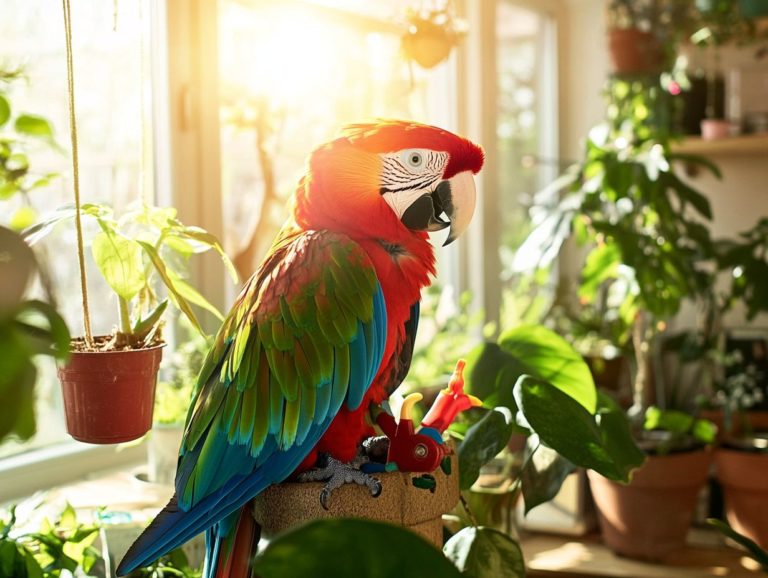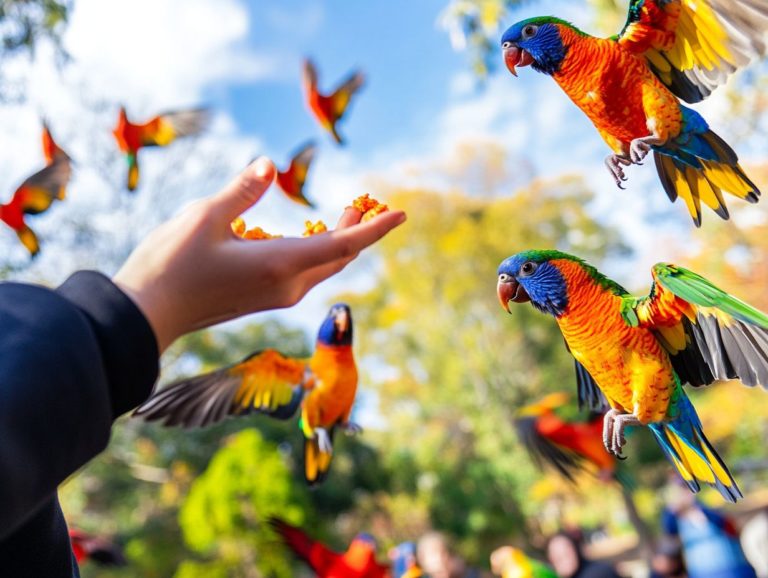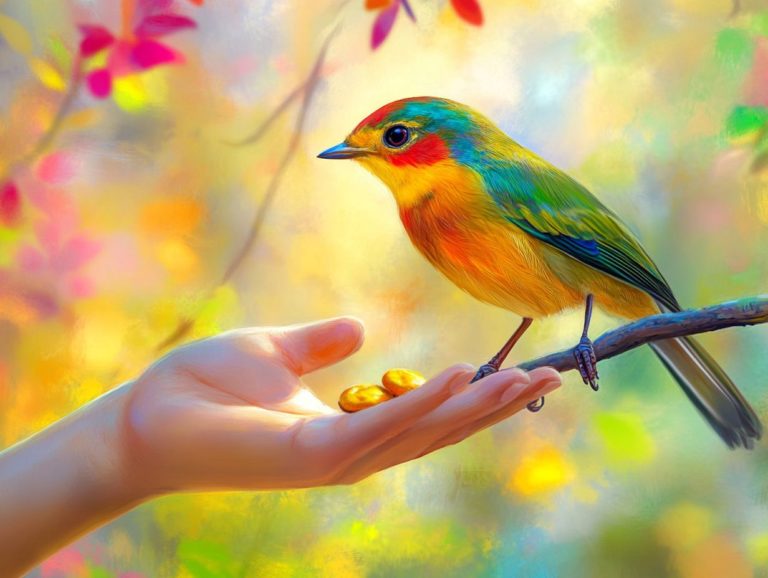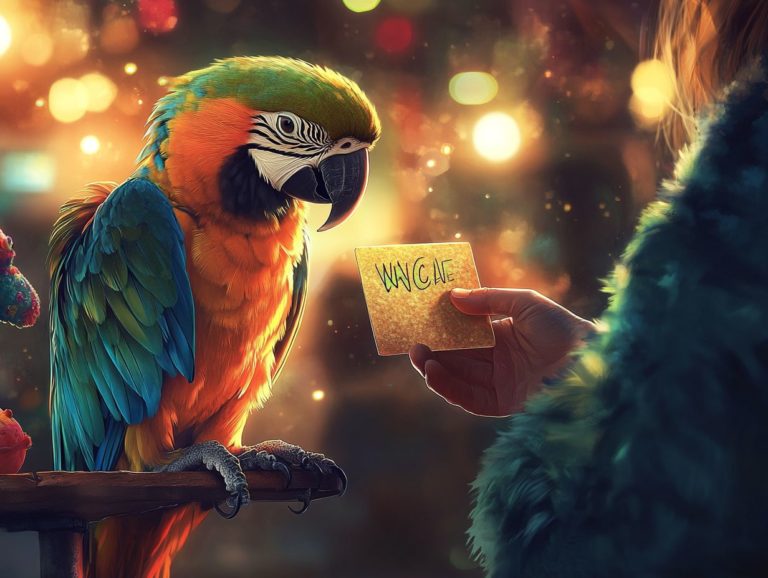5 Signs Your Bird is Bored
Birds are remarkably intelligent and social beings, requiring both mental and physical stimulation to thrive. If you ve observed your feathered friend acting out, it could be a sign of boredom.
This exploration delves into five red flags that indicate your bird may need more attention and engagement. From feather plucking to excessive noise, recognizing these behaviors is essential for your pet s well-being.
You ll also discover tips on creating a vibrant environment and fostering a deeper bond with your bird. Keeping your bird engaged through environmental enrichment which means providing toys and activities to keep your bird busy is crucial. Together, let s ensure your avian companion remains happy and healthy!
Contents
- Key Takeaways:
- 1. Your Bird Is Plucking Its Feathers
- 2. Your Bird Is Making Excessive Noise
- 3. Your Bird Is Overeating
- 4. Your Bird Is Engaging in Destructive Behavior
- 5. Your Bird Is Showing Signs of Depression
- How to Keep Your Bird Entertained and Stimulated?
- Frequently Asked Questions
- What are the signs that my bird is bored?
- How do I know if my bird needs more mental stimulation?
- What can I do to alleviate my bird’s boredom?
- Is it normal for birds to get bored?
- What are some toys and activities that can prevent boredom in birds?
- How can I tell if my bird is happy and mentally stimulated?
Key Takeaways:
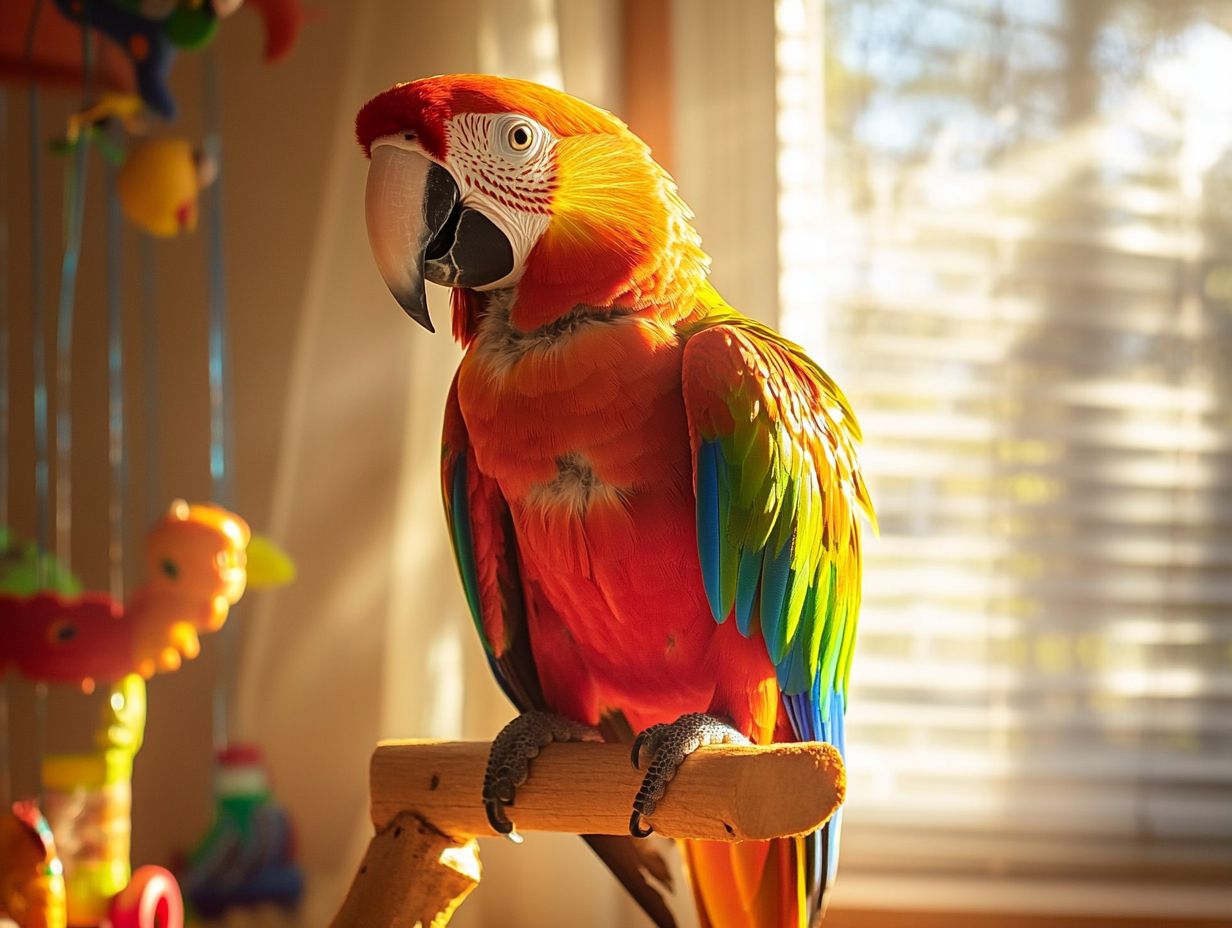
- Feather plucking is a sign of boredom in birds.
- Excessive noise can also indicate boredom in your feathered friend.
- Overeating is a common behavior in bored birds and can be linked to stress.
1. Your Bird Is Plucking Its Feathers
If you observe your bird whether it’s a cockatoo, African gray, or Quaker parrot engaging in feather plucking, it could signal deeper emotional problems, stress, or environmental shifts that impact its well-being. This behavior requires your immediate attention to prevent self-mutilation and further psychological distress.
Stress can arise from various sources, including significant changes in your household, loud noises, or the introduction of new pets. Anxiety may come from not enough social interaction or lack of stimulation, prompting your feathered friend to resort to this harmful behavior.
A crucial first step is to consult a veterinarian to rule out any underlying medical issues contributing to feather picking. Don t wait! Schedule a vet visit today!
Once health concerns are addressed, you can implement behavioral interventions. Providing ample environmental enrichment like toys, puzzles, and opportunities for play along with creating a safe, cozy space can greatly enhance your bird’s emotional stability and overall happiness.
2. Your Bird Is Making Excessive Noise
Excessive vocalization in your bird, whether it s a Quaker parrot or a lovebird, can signal a range of emotional states, from anxiety and stress to a desire for attention or interaction. This calls for a closer inspection of its environment and routine.
Remember, not every sound your bird makes is a cry for help! Different species exhibit unique vocal patterns that may convey happiness, curiosity, or even playfulness. For example, a cheerful chirp often suggests contentment, while repetitive squawking might indicate boredom or loneliness.
Take the time to observe your feathered companion closely, noting the specific circumstances surrounding each vocalization. Engaging them with toys, social interaction, and mental stimulation can greatly enhance their emotional well-being. Dedicating time each day for one-on-one interaction can help satisfy their social needs, nurturing a bond that reduces their urge to call out excessively for attention.
3. Your Bird Is Overeating
Overeating in birds like the African gray or Eclectus parrot can often signal a decreased appetite later on, which may indicate emotional problems or environmental changes impacting their feeding habits. Such changes can make them feel anxious.
Stress and boredom emerge as significant factors that prompt your avian companions to overindulge. Changes in their surroundings like introducing new pets, loud noises, or even minor shifts in daily routines can elevate stress levels, pushing these birds to seek comfort in excessive eating. A lack of mental stimulation can breed boredom, further encouraging them to consume more than necessary.
To tackle this, it’s essential to monitor their feeding habits closely and adjust their diets for a balanced nutritional intake that supports both their physical health and emotional well-being. Providing environmental enrichment such as engaging toys and ample social interaction can play a pivotal role in maintaining a healthy eating pattern among these intelligent creatures.
In conclusion, keeping your bird engaged is vital. Take action today to ensure your feathered friend feels loved, stimulated, and happy!
4. Your Bird Is Engaging in Destructive Behavior
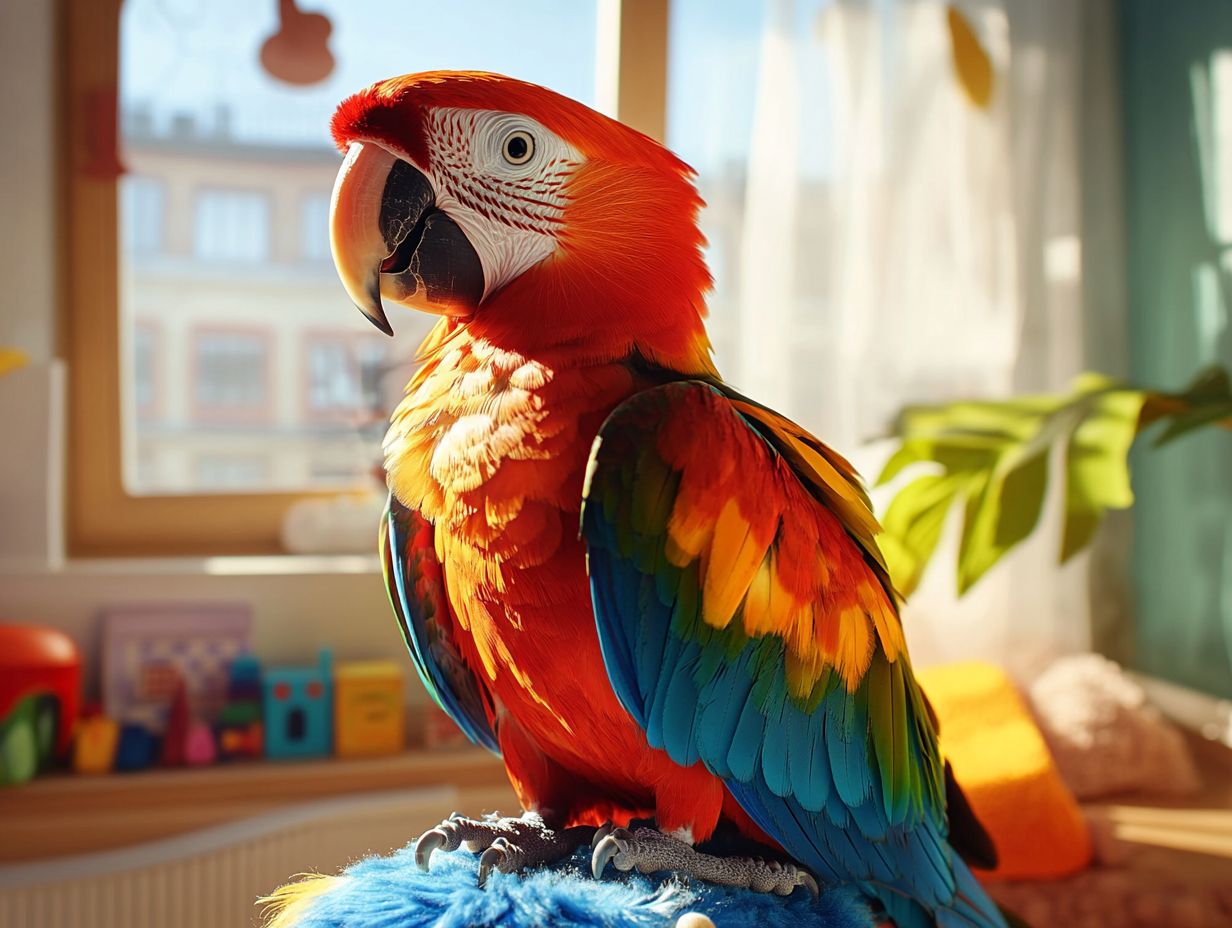
Destructive behaviors in birds often show up as repeated actions or even chewing on your furniture. Provide engaging toys and activities to meet their needs.
You might notice behaviors such as excessive feather plucking, relentless beak grinding, or disruptive vocalizations. These actions could indicate that your bird needs more mental stimulation, and they may also be signs your bird is not eating enough.
Introducing a variety of stimulating toys, like foraging games that encourage your bird to search for food or chewable items, can help redirect their energy positively. Interactive activities, such as training sessions or playdates with other birds, can also enhance their environment.
By offering these enriching experiences, you keep your feathered friends entertained and nurture their well-being, ultimately reducing the chances of destructive tendencies.
5. Your Bird Is Showing Signs of Depression
Signs of depression include decreased activity and withdrawal, and they can be alarming. These behaviors often stem from changes in routine or environmental factors, making it essential to provide a safe space and consider a veterinary examination to evaluate their emotional health.
Look for reduced vocalizations or a lack of interest in play. These can indicate emotional distress. Pay attention to whether they re fluffed up for extended periods or if there are shifts in their eating habits; these behaviors can signal sadness or anxiety.
Creating a safe and nurturing environment is crucial for their well-being. Ensure they have a spacious cage, access to sunlight, and engaging toys to stimulate their senses. Regular interaction through conversation, training, or simply being nearby can significantly enhance their emotional health, allowing them to reclaim their vibrancy and joy in life.
How to Keep Your Bird Entertained and Stimulated?
Keep your bird entertained and stimulated for its happiness. This involves a range of enrichment activities, interactive play, and creating fun environments that cater to your bird’s specific needs and behaviors ultimately enhancing both its happiness and the bond you share.
To achieve this, consider introducing a variety of toys that encourage foraging and problem-solving skills. Regularly rotating these toys will keep your bird’s interest piqued and prevent boredom. Additionally, being aware of the top signs of a healthy pet bird is essential. Engaging in daily activities together, whether teaching tricks or simply having a chat, can establish a stimulating routine that fosters trust and companionship.
Social interactions be it through gentle handling or just being in the same space are vital. They can significantly enhance your bird s mental health and reduce the likelihood of behavioral issues. Creating a dynamic and interactive space ensures a happier, healthier bird that truly thrives in its environment.
What Are Some Enrichment Activities for Birds?
Use toys and games to keep your birds engaged and happy. These activities are essential for promoting their emotional health and preventing boredom that can lead to issues.
Tailor activities to different species, recognizing each bird’s unique instincts. For instance, parrots often relish problem-solving challenges, which you can facilitate with puzzle feeders that reward them with delicious treats. On the other hand, smaller birds like finches thrive in environments with flight paths created by hanging toys or foraging opportunities.
By incorporating these customized activities into their daily routines, you stimulate your feathered friends mentally and enhance their overall well-being. Such engagement can lead to reduced stress, less destructive behavior, and a happier, healthier life for your avian companions.
How Can You Create a Stimulating Environment for Your Bird?
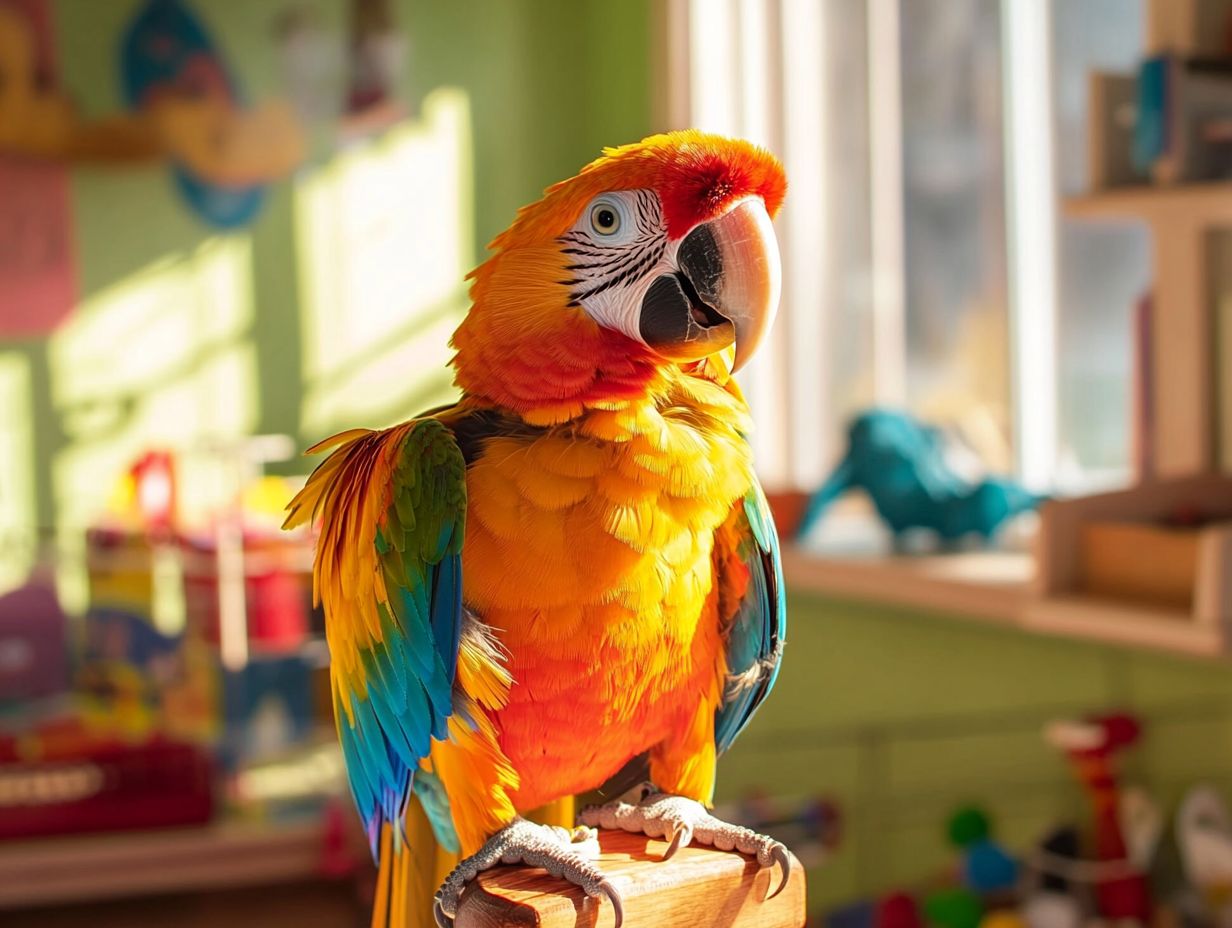
Creating a stimulating environment for your bird involves thoughtfully incorporating various elements such as toys, climbing structures, and safe spaces. These features meet their mental health needs and cater to their natural habits, promoting exploration and play.
It s essential to set up a diverse array of toys. These encourage interaction and keep their minds engaged. Consider options like puzzles and toys that encourage searching for food that enhance cognitive skills and nurture curiosity.
Adding varied perches at different heights allows your bird to exercise its wings and engage in climbing. This is crucial for maintaining physical health.
Establishing designated safe zones where they can retreat provides security. This significantly helps reduce stress. These components offer rich opportunities for play and exercise, playing a vital role in your bird’s overall mental well-being. Your bird deserves a fun and happy life!
What Are Some Tips for Bonding with Your Bird?
Bonding with your bird, whether it s a Quaker parrot or a cockatoo, demands consistent interaction and understanding of its emotional needs. Building this bond takes time, but it s worth every moment!
Each bird has its unique personality and preferences. Regular interactions, such as playtime or training sessions, allow your feathered friend to become accustomed to your presence, fostering a sense of security and comfort.
It s essential to approach your bird with patience. Tune in to its body language and vocalizations to gauge its emotional state. Gentle handling and positive reinforcement during these moments can significantly reinforce trust.
By being attuned to your bird s cues, a deeper bond can blossom, enriching both its life and your experience as an owner.
How Can You Tell If Your Bird Is Happy and Content?
Recognizing whether your bird is happy and content requires keen observation of its behaviors, vocalizations, and overall demeanor. These cues are windows into its emotional states and well-being.
A lively bird often delights in playful antics, swinging from perches, chewing on toys, or flapping its wings with enthusiasm. These actions signal a sense of security and joy in its surroundings.
You ll also notice a happy bird engaging in cheerful vocalizations, singing or chattering, eager to connect with you. Moments of bonding, where your bird seeks attention or cuddles, further reflect its emotional health.
By tuning into these signs, you can create an enriching environment that nurtures happiness and ensures your feathered friend leads a fulfilling life. Being aware of 6 signs your cockatiel may be sick is crucial for their well-being.
What Are Some Common Mistakes Bird Owners Make That Can Lead to Boredom?
Common mistakes made by bird owners, such as neglecting interaction and failing to provide adequate environmental enrichment, can lead to boredom and negative behaviors. To combat this, consider exploring 5 ways to enhance your bird’s mental health, as this ultimately impacts your bird’s emotional well-being.
These oversights often arise from a lack of awareness regarding the specific needs that feathered companions require. Many owners fall into the trap of monotonous routines that overlook their birds need for stimulation.
To counteract this, it s essential for you to regularly rotate toys and introduce new activities. Encourage exploration and mental challenges. Dedicating time each day to engage in play or training sessions fosters a deeper bond and keeps those little minds sharp.
By recognizing these common pitfalls and making small yet significant changes, you can enhance the overall quality of life for your avian friend.
Frequently Asked Questions
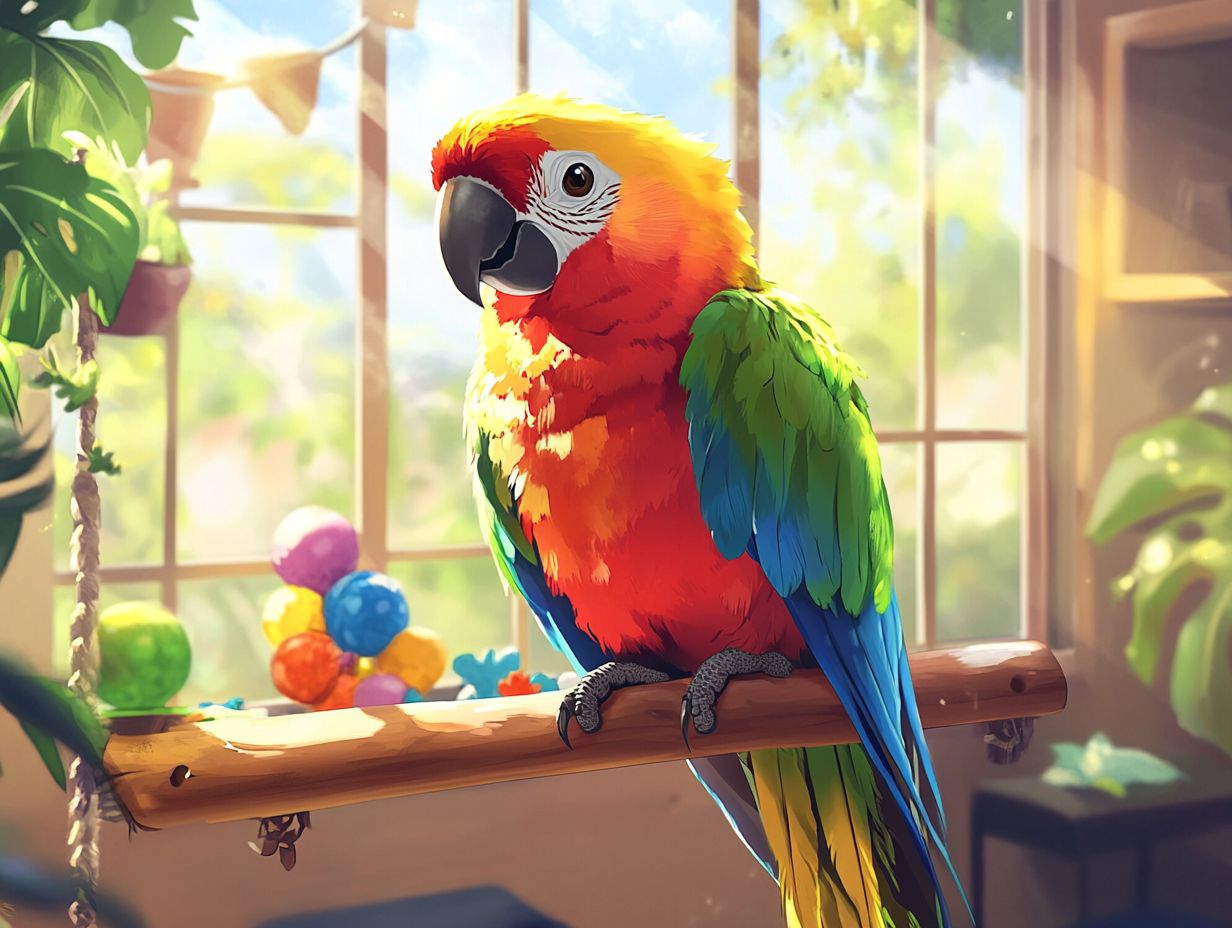
What are the signs that my bird is bored?
Some common signs that your bird may be bored include excessive vocalization, feather plucking, repetitive or destructive behaviors, lack of interest in toys or activities, and increased aggression towards other birds or humans. To learn more about these behaviors, check out what are the signs of a bored bird.
How do you keep your bird entertained? Share your tips in the comments!
How do I know if my bird needs more mental stimulation?
If your bird seems bored, it may need more mental stimulation.
Consider introducing new toys, providing foraging opportunities, and engaging more with its environment and other beings.
What can I do to alleviate my bird’s boredom?
You can alleviate your bird’s boredom by offering a variety of toys and activities.
Rotate the toys regularly and spend quality time interacting with your bird daily.
Is it normal for birds to get bored?
Yes, it is completely normal for birds to experience boredom.
In the wild, birds enjoy various activities and social interactions.
In captivity, they rely on their owners to provide this mental and physical stimulation.
What are some toys and activities that can prevent boredom in birds?
Get creative! Foraging toys, puzzle toys, chew toys, climbing structures, and interactive games can all keep your bird entertained and happy.
It’s important to provide a variety of options to keep them engaged and stimulated.
How can I tell if my bird is happy and mentally stimulated?
A happy bird sings, plays, and explores its surroundings.
Look for a shiny feather coat and a healthy weight as signs of your bird’s well-being.

